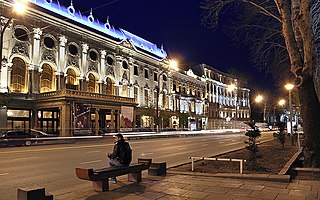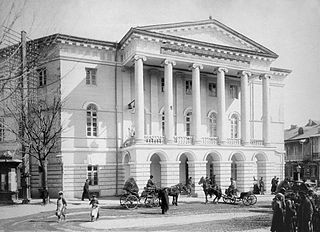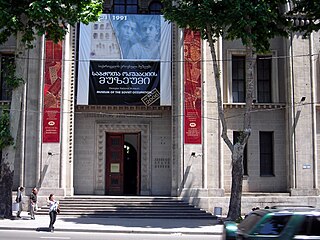Related Research Articles

Gori is a city in eastern Georgia, which serves as the regional capital of Shida Kartli and is located at the confluence of two rivers, the Mtkvari and the Liakhvi. Gori is the fifth most populous city in Georgia. Its name comes from the Georgian word gora (გორა), meaning "heap", "hill", or "mountain".

A gas explosion is the ignition of a mixture of air and flammable gas, typically from a gas leak. In household accidents, the principal explosive gases are those used for heating or cooking purposes such as natural gas, methane, propane, butane. In industrial explosions many other gases, like hydrogen, as well as evaporated (gaseous) gasoline or ethanol play an important role. Industrial gas explosions can be prevented with the use of intrinsic safety barriers to prevent ignition, or use of alternative energy.

The Parliament of Georgia is the supreme national legislature of Georgia. It is a unicameral parliament, currently consisting of 150 members; of these, 120 are proportional representatives and 30 are elected through single-member district plurality system, representing their constituencies. According to the 2017 constitutional amendments, the Parliament will transfer to fully proportional representation in 2024.

Trialeti Range is an east-west mountain range of the Lesser Caucasus Mountains in the Samtskhe–Javakheti region of southern Georgia.
The 2006 Russia–Georgia energy crisis describes an international incident triggered by two explosions on the Mozdok–Tbilisi natural gas pipeline in North Ossetia on January 22, 2006. The explosions suspended gas supply to Georgia at a time when the weather was particularly cold, leading to allegations of deliberate energy blackmail carried out by the Russian government.

Rustaveli Avenue, formerly known as Golovin Street, is the central avenue in Tbilisi named after the medieval Georgian poet, Shota Rustaveli.

Tbilisi Aircraft Manufacturing (TAM), also known as JSC Tbilaviamsheni, is a Georgian aerospace development and manufacturing company, which also partially manufactures APCs and IFVs.

Zasyadko Mine is a coal mining company in Ukraine's eastern city of Donetsk. Following the start of the War in Donbass in 2014 the mine became situated in rebel controlled territory.

The Art Museum of Georgia (AMG) (Georgian: საქართველოს ხელოვნების მუზეუმი, sak'art'velos khelovnebis muzeumi), alternatively known as Shalva Amiranashvili Museum of Fine Arts, is one of the leading museums in the country of Georgia. Falling under the umbrella of the Georgian National Museum, AMG is located near Freedom Square, Tbilisi and possesses around 140,000 items of Georgian, Oriental, Russian, and other European art.

The Museum of the Soviet Occupation is a history museum in Tbilisi, Georgia, documenting the seven decades of the Soviet rule in Georgia (1921–1991) and dedicated to the history of the anti-occupational, national-liberation movement of Georgia, to the victims of the Soviet political repressions throughout this period. It was established on May 26, 2006. The museum is a part of the Georgian National Museum (GNM).

The 2008 Yevpatoria gas explosion took place on December 24, 2008, with an explosion in an apartment block in Yevpatoria, a Ukrainian Black Sea resort town. Within hours, the death toll stood at 22 with 10 missing. On December 26 the total number of deaths was 27 people. President Viktor Yushchenko declared December 26 to be a day of national mourning.

The Tbilisi Marriott Hotel is a luxury five-star hotel located on Rustaveli Avenue in Tbilisi, Georgia. Built as a high-class hotel on the commission of the wealthy Armenian merchant Mikael Aramyants, it was opened in 1915 as Hôtel Majestic.
The 2010 Connecticut power plant explosion occurred at the Kleen Energy Systems power station in Middletown, Connecticut, United States at 11:17 am EST on February 7, 2010. The plant had been under construction from September 2007, and was scheduled to start supplying energy in June 2010. The initial blast killed five and injured at least fifty; one of the injured later died in hospital, bringing the total death toll to six.
Ateni was a medieval city in Georgia, in the valley of the Tana river, on both banks of the river. Ateni was built in the 11th century by the Georgian king Bagrat IV. The city was secured with three fortresses located near Ateni: Ateni fortress, Vere fortress and Dektsikhe. In the 13th–17th centuries Ateni was still considered an important place in the country but in the 18th century it began decreasing in importance and gradually the town became a village.
This is a list of terrorist attacks in Pakistan in the calendar year 2011.
The 1990 Tbilisi–Aghdam bus bombing, also known as 1990 Khanlar bus bombing occurred on 10 August 1990, in the vicinity of Khanlar, when an explosive device blew up in a bus 12.5 km away from Azerbaijan's second largest city, Ganja.
The events in 2010 in Georgia.
The Boksburg explosion took place on 24 December 2022, when a fuel tanker carrying liquefied petroleum gas (LPG) exploded underneath a railway bridge in Boksburg, in the Ekurhuleni Metropolitan Municipality in Gauteng, South Africa, with a death toll of 41 people as of 18 January 2023. Nearby infrastructure was damaged by the explosion.
References
- ↑ Oberg, James E. (February 1988). Uncovering Soviet disasters: exploring the limits of glasnost . Random House. pp. 110. ISBN 978-0-394-56095-3.
- ↑ "At Least 100 Reported Killed In Soviet Georgian Gas Blast". The New York Times . Reuters. December 23, 1984. ISSN 0362-4331 . Retrieved March 6, 2022.
- ↑ "Georgia blast claims 100 victims". The Globe and Mail . Moscow. Associated Press. December 24, 1984. p. 16. ProQuest 386393792.
41°42′36″N44°47′35″E / 41.709981°N 44.792998°E